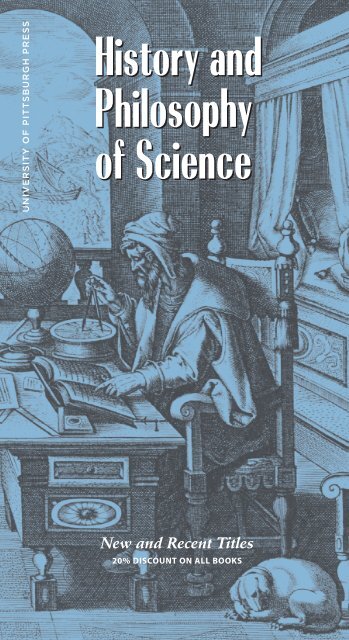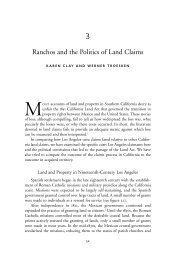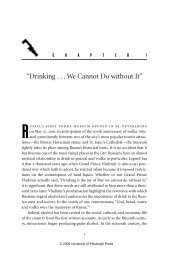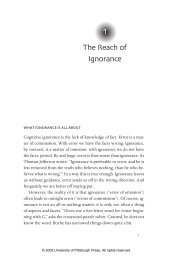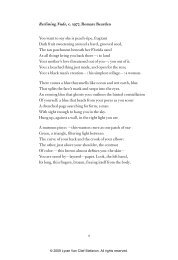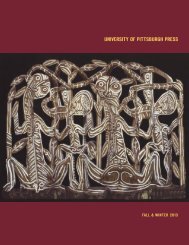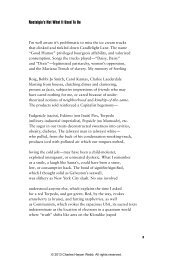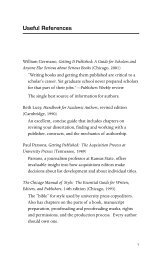History and Philosophy of Science - University of Pittsburgh Press
History and Philosophy of Science - University of Pittsburgh Press
History and Philosophy of Science - University of Pittsburgh Press
You also want an ePaper? Increase the reach of your titles
YUMPU automatically turns print PDFs into web optimized ePapers that Google loves.
UNIVERSITY OF PITTSBURGH PRESS<br />
<strong>History</strong> <strong>and</strong><br />
<strong>Philosophy</strong><br />
<strong>of</strong> <strong>Science</strong><br />
New <strong>and</strong> Recent Titles<br />
20% DISCOUNT ON ALL BOOKS
The <strong>University</strong> <strong>of</strong> <strong>Pittsburgh</strong> <strong>Press</strong> is pleased to present its<br />
new <strong>and</strong> recent titles in the history <strong>and</strong> philosophy <strong>of</strong><br />
science. These titles represent the <strong>Press</strong>’s commitment<br />
to publishing the best scholarship in these fields. Additional<br />
sections feature our recently introduced Prologue Editions,<br />
where nearly 500 out-<strong>of</strong>-print titles have been made available<br />
again, <strong>and</strong> the <strong>Pittsburgh</strong>-Konstanz Series in the <strong>Philosophy</strong><br />
<strong>and</strong> <strong>History</strong> <strong>of</strong> <strong>Science</strong>.<br />
The <strong>Press</strong> seeks additional titles in order to amplify its already<br />
strong backlist in philosophy <strong>of</strong> science <strong>and</strong> exp<strong>and</strong> into fresh<br />
areas <strong>of</strong> promising historical research. Historical titles that are<br />
globally informed, <strong>and</strong> that reach across traditional disciplinary<br />
boundaries will be given special attention. The <strong>Press</strong> welcomes<br />
proposals that explore scientific thought <strong>and</strong> practice in any<br />
culture <strong>and</strong> during any era. Both experienced <strong>and</strong> new authors<br />
are strongly encouraged to submit proposals for new books.<br />
If you would like to make a submission, please contact Peter<br />
Kracht, Editorial Director, at pek6@pitt.edu. Information on<br />
manuscript submission is also available on our website:<br />
www.upress.pitt.edu/forAuthors.aspx.<br />
CONTENTS<br />
<strong>History</strong> <strong>of</strong> <strong>Science</strong> <strong>and</strong> Medicine …………………………3–8<br />
<strong>Philosophy</strong> <strong>of</strong> <strong>Science</strong> ………………………………………9–20<br />
<strong>Pittsburgh</strong>-Konstanz Series ………………………………21–24<br />
Prologue Editions …………………………………………………25
HISTORY OF SCIENCE NEW<br />
2012 • 320 pp.<br />
978-0-8229-4418-8 • Cloth • $27.95<br />
ITEM NO. 501 • SALE PRICE $22.36<br />
<strong>History</strong> <strong>of</strong> <strong>Science</strong><br />
The Cult <strong>of</strong> Pythagoras<br />
Math <strong>and</strong> Myths<br />
Alberto A. MArtínez<br />
“Martínez not only rigorously compares the exciting<br />
myths about Pythagoras with the sparse, <strong>and</strong> mostly<br />
contradictory, historical sources, he also explains<br />
why we have these myths <strong>and</strong> the purposes they<br />
serve. His book will be a natural first port <strong>of</strong> call for<br />
people who like to get this sort <strong>of</strong> thing right.“<br />
—Jeremy Gray, The Open <strong>University</strong><br />
“Mathematics is the last subject one would expect<br />
to be infested with mythology, but even mathematicians<br />
can fall for myths, particularly those concerning<br />
the history <strong>of</strong> their subject. In this<br />
delightful exposé, Alberto Martínez finally busts the<br />
many myths <strong>of</strong> math, <strong>and</strong> the results are both sobering<br />
<strong>and</strong> fascinating.”<br />
—John C. Stillwell, <strong>University</strong> <strong>of</strong> San Francisco<br />
In this follow-up to his popular <strong>Science</strong> Secrets, Alberto A. Martínez discusses<br />
various popular myths from the history <strong>of</strong> mathematics: that Pythagoras proved<br />
the hypotenuse theorem, that Archimedes figured out how to test the purity <strong>of</strong><br />
a gold crown while he was in a bathtub, that the Golden ratio is in nature <strong>and</strong> ancient<br />
architecture, that the young Galois created group theory the night before the<br />
pistol duel that killed him, <strong>and</strong> more. Some stories are partly true, others are entirely<br />
false, but all show the power <strong>of</strong> invention in history. Pythagoras emerges as a symbol<br />
<strong>of</strong> the urge to conjecture <strong>and</strong> “fill in the gaps” <strong>of</strong> history. He has been credited<br />
with fundamental discoveries in mathematics <strong>and</strong> the sciences, yet there is nearly<br />
no evidence that he really contributed anything to such fields at all. this book asks:<br />
how does history change when we subtract the many small exaggerations <strong>and</strong> interpolations<br />
that writers have added for over two thous<strong>and</strong> years?<br />
The Cult <strong>of</strong> Pythagoras is also about invention in a positive sense. Most people<br />
view mathematical breakthroughs as “discoveries” rather than invention or creativity,<br />
believing that mathematics describes a realm <strong>of</strong> eternal ideas. but mathematicians<br />
have disagreed about what is possible <strong>and</strong> impossible, about what counts as<br />
a pro<strong>of</strong>, <strong>and</strong> even about the results <strong>of</strong> certain operations. Was there ever invention<br />
in the history <strong>of</strong> concepts such as zero, negative numbers, imaginary numbers,<br />
quaternions, infinity, <strong>and</strong> infinitesimals?<br />
Martínez inspects a wealth <strong>of</strong> primary sources, in several languages, over a span<br />
<strong>of</strong> many centuries. by exploring disagreements <strong>and</strong> ambiguities in the history <strong>of</strong> the<br />
elements <strong>of</strong> mathematics, The Cult <strong>of</strong> Pythagoras dispels myths that obscure the<br />
actual origins <strong>of</strong> mathematical concepts. Martínez argues that an accurate history<br />
that analyzes myths reveals neglected aspects <strong>of</strong> mathematics that can encourage<br />
creativity in students <strong>and</strong> mathematicians.<br />
UNIVERSITY OF PITTSBURGH PRESS • <strong>History</strong> <strong>and</strong> <strong>Philosophy</strong> <strong>of</strong> <strong>Science</strong> 3
HISTORY OF SCIENCE<br />
<strong>Science</strong> Secrets<br />
The Truth about Darwin’s Finches,<br />
Einstein’s Wife, <strong>and</strong> Other Myths<br />
Alberto A. MArtínez<br />
“In a laudable effort to separate the fragments <strong>of</strong><br />
truth from the hype surrounding a number <strong>of</strong> eureka<br />
moments in the history <strong>of</strong> science, Martínez<br />
skillfully reveals how even the best biographers <strong>and</strong><br />
writers make plausible but incorrect connections<br />
between historical events <strong>and</strong> <strong>of</strong>ten rely on their<br />
imagination instead <strong>of</strong> the facts. This book should<br />
be required reading for all college science majors.<br />
The author’s meticulous <strong>and</strong> engaging use <strong>of</strong> historical<br />
evidence will also appeal to history <strong>of</strong> science<br />
enthusiasts.”<br />
—Library Journal<br />
“[Martínez] combines the best qualities <strong>of</strong> popular<br />
science writing with the thorough documentation<br />
that one would expect from a pr<strong>of</strong>essional historian.<br />
Highly recommended.”<br />
—Choice<br />
2011 • 344 pp.<br />
978-0-8229-4407-2 • Cloth • $24.95<br />
ITEM NO. 502 • SALE PRICE $19.96<br />
Was Darwin really inspired by Galápagos finches? Did einstein’s wife secretly contribute<br />
to his theories? Did Franklin fly a kite in a thunderstorm? Did a falling apple<br />
lead newton to universal gravity? Did Galileo drop objects from the leaning tower<br />
<strong>of</strong> Pisa? Did einstein really believe in God?<br />
<strong>Science</strong> Secrets answers these questions <strong>and</strong> many others. It is a unique study <strong>of</strong> how<br />
myths evolve in the history <strong>of</strong> science. Some tales are partly true, others are mostly false, yet<br />
all illuminate the tension between the need to fairly describe the past <strong>and</strong> the natural desire<br />
to fill in the blanks.<br />
energetically narrated, <strong>Science</strong> Secrets pits famous myths against extensive research from<br />
primary sources in order to accurately portray important episodes in the sciences. Alberto A.<br />
Martínez analyzes how such myths grow <strong>and</strong> rescues neglected facts that are more captivating<br />
than famous fictions. Moreover, he shows why opinions that were once secret <strong>and</strong><br />
seemingly impossible are now scientifically compelling. the book includes new findings related<br />
to the Copernican revolution, alchemy, Pythagoras, young einstein, <strong>and</strong> other events<br />
<strong>and</strong> figures in the history <strong>of</strong> science.<br />
4 UNIVERSITY OF PITTSBURGH PRESS • <strong>History</strong> <strong>and</strong> <strong>Philosophy</strong> <strong>of</strong> <strong>Science</strong>
2011 • 376 pp.<br />
978-0-8229-6151-2 • Paper • $27.95<br />
ITEM NO. 503 • SALE PRICE $22.36<br />
eBook available<br />
HISTORY OF SCIENCE<br />
Styles <strong>of</strong> Knowing<br />
A New <strong>History</strong> <strong>of</strong> <strong>Science</strong> from<br />
Ancient Times to the Present<br />
CHunGlIn KWA<br />
“[A] very readable account <strong>of</strong> the history <strong>of</strong> scientific<br />
knowledge, it deserves a much wider audience<br />
than those who are able to underst<strong>and</strong> the Dutch<br />
language.”<br />
—Isis, review <strong>of</strong> the original Dutch edition<br />
“Kwa has written not only a fine introduction to the<br />
history <strong>of</strong> science from antiquity to the twenty-first<br />
century, but he has used the concept <strong>of</strong> ‘style’ to illuminate<br />
various modes <strong>of</strong> scientific rationality <strong>and</strong><br />
current threats to freedom <strong>of</strong> inquiry. A most impressive<br />
achievement.”<br />
—Harold J. Cook, Brown <strong>University</strong><br />
Now available in english, Styles <strong>of</strong> Knowing explores the development <strong>of</strong> various scientific<br />
reasoning processes in cultural-historical context. Influenced by historian Alistair<br />
Crombie’s Styles <strong>of</strong> Scientific Thinking in the European Tradition, Chunglin<br />
Kwa organizes his book according to six distinct styles: deductive, experimental, analyticalhypothetical,<br />
taxonomic, statistical, <strong>and</strong> evolutionary. Instead <strong>of</strong> featuring individual scientific<br />
disciplines in different chapters, each chapter explains the historical applications <strong>of</strong> each<br />
style’s unique criterion for good science. Kwa shows also how styles have influenced each<br />
other <strong>and</strong> transformed over time. In a chapter written especially for American audiences, Kwa<br />
examines how changes in engineering <strong>and</strong> technology during the twentieth century affected<br />
the balance among the various styles <strong>of</strong> science.<br />
based on extensive research in Greek <strong>and</strong> latin primary sources <strong>and</strong> numerous modern<br />
secondary sources, Kwa demonstrates the heterogeneous nature <strong>of</strong> scientific discovery. this<br />
accessible <strong>and</strong> innovative introduction to scientific change provides a foundational history for<br />
the classroom, historians, <strong>and</strong> nonspecialists.<br />
UNIVERSITY OF PITTSBURGH PRESS • <strong>History</strong> <strong>and</strong> <strong>Philosophy</strong> <strong>of</strong> <strong>Science</strong> 5
HISTORY OF SCIENCE<br />
The Dispute <strong>of</strong> the<br />
New World<br />
The <strong>History</strong> <strong>of</strong> a Polemic, 1750-1900<br />
Antonello GerbI<br />
translated by JereMy Moyle<br />
“Vast <strong>and</strong> fascinating. Now at last, updated <strong>and</strong> admirably translated<br />
by Dr. Jeremy Moyle, we have it in English; <strong>and</strong> none too<br />
soon, for this is a book which should be on the shelf <strong>of</strong> everyone<br />
who is curious not only about the European image <strong>of</strong> America<br />
but also about the history <strong>of</strong> man's attitude to man. Dr.<br />
Gerbi’s study is a monument both to erudition <strong>and</strong> to fastidious<br />
wit; the outcome <strong>of</strong> years <strong>of</strong> reading <strong>and</strong> reflection by a historian<br />
<strong>of</strong> ideas who is at once playful <strong>and</strong> wise.”<br />
—New York Review <strong>of</strong> Books<br />
“Gerbi’s book is fascinating. His scholarship is vast. A superb<br />
<strong>and</strong> significant study dealing with an aspect <strong>of</strong> the Enlightenment<br />
that is usually ignored. The work will be <strong>of</strong> interest to a<br />
wide range <strong>of</strong> scholars in the history <strong>of</strong> ideas.”<br />
—Journal <strong>of</strong> the <strong>History</strong> <strong>of</strong> <strong>Philosophy</strong><br />
Nature in the<br />
New World<br />
From Christopher Columbus to<br />
Gonzalo Fernández de Oviedo<br />
Antonello GerbI<br />
translated by JereMy Moyle<br />
“This book glows with the fully assimilated learning <strong>of</strong> the polymath<br />
Gerbi, whose comm<strong>and</strong> <strong>and</strong> underst<strong>and</strong>ing <strong>of</strong> the literature<br />
<strong>of</strong> various cultures enlightens every page. Neither a notice<br />
nor a full-fledged review could do justice either to the brilliance<br />
<strong>of</strong> the book or to the felicity <strong>of</strong> Moyle’s translation. The book<br />
must be read to be appreciated.”<br />
—Early American Literature<br />
“A fascinating work, it is divided into two parts: the first deals<br />
with eleven writers from Columbus to Verrazzano, while the remaining<br />
two-thirds <strong>of</strong> the book deal with the other treasure from<br />
the Indies—Oviedo’s writings <strong>and</strong> observations. This prodigiously<br />
learned work is full <strong>of</strong> good things.”<br />
—American Historical Review<br />
2010 • 720 pp.<br />
978-0-8229-6081-2 • Paper • $29.95<br />
ITEM NO. 504 • SALE PRICE $23.96<br />
eBook available<br />
2010 • 480 pp.<br />
978-0-8229-6080-5 • Paper • $29.95<br />
ITEM NO. 505 • SALE PRICE $23.96<br />
eBook available<br />
6 UNIVERSITY OF PITTSBURGH PRESS • <strong>History</strong> <strong>and</strong> <strong>Philosophy</strong> <strong>of</strong> <strong>Science</strong>
HISTORY OF MEDICINE NEW<br />
2012 • 576 pp.<br />
978-0-8229-4413-3 • Cloth • $65.00<br />
ITEM NO. 506 • SALE PRICE $52.00<br />
eBook available<br />
<strong>History</strong> <strong>of</strong> Medicine<br />
A <strong>History</strong> <strong>of</strong><br />
Organ Transplantation<br />
Ancient Legends to Modern Practice<br />
DAVID HAMIlton<br />
“This beautiful history . . . gives a sense <strong>of</strong> the vivacity<br />
<strong>of</strong> scientific experience, its errors <strong>and</strong> insights,<br />
<strong>and</strong> the way in which cultural traits, individual lives,<br />
<strong>and</strong> technical knowledge combine to create a field<br />
<strong>of</strong> clinical medicine. . . . Those who are willing to<br />
read David Hamilton will find a well-written <strong>and</strong> exciting<br />
history—physiology <strong>and</strong> medicine, <strong>and</strong> the<br />
lives <strong>of</strong> those who pursue them, will seem more fascinating,<br />
<strong>and</strong> science more wild <strong>and</strong> willful.”<br />
—Times Literary Supplement<br />
“A comprehensive, authoritative history <strong>of</strong> a transformative<br />
field <strong>of</strong> medicine. This history is well<br />
crafted <strong>and</strong> global in scope. . . . scholars <strong>and</strong> historians<br />
<strong>of</strong> medicine will find Hamilton a thorough<br />
guide to a complex subject.”<br />
—Library Journal<br />
A<strong>History</strong> <strong>of</strong> Organ Transplantation is a comprehensive <strong>and</strong> ambitious exploration<br />
<strong>of</strong> transplant surgery—which, surprisingly, is one <strong>of</strong> the longest continuous<br />
medical endeavors in history. Moreover, no other medical enterprise<br />
has had so many multiple interactions with other fields, including biology, ethics,<br />
law, government, <strong>and</strong> technology. exploring the medical, scientific, <strong>and</strong> surgical<br />
events that led to modern transplant techniques, Hamilton argues that progress in<br />
successful transplantation required a unique combination <strong>of</strong> multiple methods, bold<br />
surgical empiricism, <strong>and</strong> major immunological insights in order for surgeons to develop<br />
an underst<strong>and</strong>ing <strong>of</strong> the body’s most complex <strong>and</strong> mysterious mechanisms.<br />
Surgical progress was nonlinear, sometimes reverting <strong>and</strong> sometimes significantly<br />
advancing through luck, serendipity, or helpful accidents <strong>of</strong> nature.<br />
the first book <strong>of</strong> its kind, A <strong>History</strong> <strong>of</strong> Organ Transplantation examines the evolution<br />
<strong>of</strong> surgical tissue replacement from classical times to the medieval period to<br />
the present day. this well-executed volume will be useful to undergraduates, graduate<br />
students, scholars, surgeons, <strong>and</strong> the general public. both Western <strong>and</strong> non-<br />
Western experiences as well as folk practices are included.<br />
UNIVERSITY OF PITTSBURGH PRESS • <strong>History</strong> <strong>and</strong> <strong>Philosophy</strong> <strong>of</strong> <strong>Science</strong> 7
NEW HISTORY OF MEDICINE<br />
Influenza<br />
A Century <strong>of</strong> <strong>Science</strong> <strong>and</strong><br />
Public Health Response<br />
GeorGe DeHner<br />
“Flu shots are an autumn ritual for millions <strong>of</strong><br />
Americans, but few know the history <strong>of</strong> the battle<br />
against influenza waged by physicians <strong>and</strong> public<br />
health <strong>of</strong>ficers around the globe over the past 120<br />
years. Dehner explains how past p<strong>and</strong>emics, which<br />
increasingly shaped reliance upon vaccination <strong>and</strong><br />
surveillance as prevention, evolved from local to regional<br />
to national to international responsibility. All<br />
those interested in the history <strong>of</strong> disease <strong>and</strong> the<br />
history <strong>of</strong> public health will benefit from his rich<br />
discussion <strong>of</strong> how today’s globalism is again changing<br />
how quickly diseases spread as well as the politics<br />
<strong>and</strong> requirements <strong>of</strong> influenza prevention.”<br />
—Alan M. Kraut, American <strong>University</strong><br />
“Well researched <strong>and</strong> written, this study ranges<br />
from the Russian flu <strong>of</strong> 1889 to the swine flu <strong>of</strong><br />
2009, embracing biology <strong>and</strong> history, medicine <strong>and</strong><br />
politics, drug research <strong>and</strong> government regulation.<br />
Dehner skillfully frames U. S. influenza experience<br />
in the global context <strong>and</strong> sheds new light on the<br />
power <strong>of</strong> the virus to sicken, kill, <strong>and</strong> confound.”<br />
— Carol R. Byerly, author <strong>of</strong> Fever <strong>of</strong> War: The<br />
Influenza Epidemic in the U.S. Army during World<br />
War I<br />
2012 • 296 pp.<br />
978-0-8229-6189-5 • Paper • $27.95<br />
ITEM NO. 507 • SALE PRICE $22.36<br />
eBook available<br />
In Influenza, George Dehner examines the wide disparity in national <strong>and</strong> international responses<br />
to influenza p<strong>and</strong>emics, from the russian flu <strong>of</strong> 1889 to the swine flu outbreak<br />
in 2009. He chronicles the technological <strong>and</strong> institutional progress made along the way<br />
<strong>and</strong> shows how these developments can shape an effective future policy.<br />
early p<strong>and</strong>emic response relied on methods <strong>of</strong> quarantine <strong>and</strong> individual scientific research.<br />
In the aftermath <strong>of</strong> World War II, a consensus for cooperation <strong>and</strong> shared resources<br />
led to the creation <strong>of</strong> the WHo, under the auspices <strong>of</strong> the united nations. today, the WHo<br />
maintains a large <strong>and</strong> proactive role in responding to influenza outbreaks. International p<strong>and</strong>emic<br />
response, however, is only as strong as its weakest national link—most recently evidenced<br />
in the failed early detection <strong>of</strong> the 2009 swine flu in Mexico <strong>and</strong> the delayed<br />
reporting <strong>of</strong> the 2002 SArS outbreak in China.<br />
As Dehner’s study contends, the hard lessons <strong>of</strong> the past highlight the need for a coordinated<br />
early warning system with full disclosure, shared technologies, <strong>and</strong> robust manufacturing<br />
capabilities. until the “national” aspect can be removed from the international equation,<br />
responses will be hampered, <strong>and</strong> a threat to an individual remains a threat to all.<br />
8 UNIVERSITY OF PITTSBURGH PRESS • <strong>History</strong> <strong>and</strong> <strong>Philosophy</strong> <strong>of</strong> <strong>Science</strong>
PHILOSOPHY OF SCIENCE NEW<br />
2011 • 232 pp.<br />
978-0-8229-6163-5 • Paper • $29.95<br />
ITEM NO. 508 • SALE PRICE $23.96<br />
eBook available<br />
<strong>Philosophy</strong> <strong>of</strong> <strong>Science</strong><br />
<strong>Science</strong> Transformed?<br />
Debating Claims <strong>of</strong> an Epochal Break<br />
edited by AlFreD norDMAnn, HAnS rADDer,<br />
<strong>and</strong> GreGor SCHIeMAnn<br />
“<strong>Science</strong> Transformed? is an important, readily accessible<br />
book that focuses on a crucial contemporary<br />
issue: the pr<strong>of</strong>ound transformation <strong>of</strong> science,<br />
technology, <strong>and</strong> society <strong>of</strong> the past few decades. We<br />
are witnessing a break <strong>of</strong> an ‘epochal nature,’ <strong>and</strong><br />
Nordmann, Radder, <strong>and</strong> Schiemann have provided<br />
us with valuable insights into what is happening.”<br />
—Silvan Schweber, Br<strong>and</strong>eis <strong>University</strong><br />
“Has science changed fundamentally during the last<br />
half century? Readymade concepts abound that<br />
claim as much: from postnormal <strong>and</strong> technoscience<br />
to the advent <strong>of</strong> a mode-2. Few are substantiated<br />
empirically. This collection does just that: probing<br />
the theses <strong>of</strong> an epochal break from a range <strong>of</strong> disciplinary<br />
vantage points, unveiling the complexity<br />
behind the fashionable rhetoric, providing fascinating<br />
insights into the new ways <strong>of</strong> research.”<br />
—Peter Weingart, Bielefeld <strong>University</strong><br />
Advancements in computing, instrumentation, robotics, digital imaging, <strong>and</strong><br />
simulation modeling have changed science into a technology-driven institution.<br />
Government, industry, <strong>and</strong> society increasingly exert their influence<br />
over science, raising questions <strong>of</strong> values <strong>and</strong> objectivity. these <strong>and</strong> other pr<strong>of</strong>ound<br />
changes have led many to speculate that we are in the midst <strong>of</strong> an epochal break<br />
in scientific history.<br />
this edited volume presents an in-depth examination <strong>of</strong> these issues from philosophical,<br />
historical, social, <strong>and</strong> cultural perspectives. It <strong>of</strong>fers arguments both for<br />
<strong>and</strong> against the epochal break thesis in light <strong>of</strong> historical antecedents. Contributors<br />
discuss topics such as: science as a continuing epistemological enterprise; the<br />
decline <strong>of</strong> the individual scientist <strong>and</strong> the rise <strong>of</strong> communities; the intertwining <strong>of</strong> scientific<br />
<strong>and</strong> technological needs; links to prior practices <strong>and</strong> ways <strong>of</strong> thinking; the alleged<br />
divide between mode-1 <strong>and</strong> mode-2 research methods; the commodification<br />
<strong>of</strong> university science; <strong>and</strong> the shift from the scientific to a technological enterprise.<br />
Additionally, they examine the epochal break thesis using specific examples, including<br />
the transition from laboratory to real world experiments; the increased reliance<br />
on computer imaging; how analog <strong>and</strong> digital technologies condition<br />
behaviors that shape the object <strong>and</strong> beholder; the cultural significance <strong>of</strong> humanoid<br />
robots; the erosion <strong>of</strong> scientific quality in experimentation; <strong>and</strong> the effect <strong>of</strong> computers<br />
on prediction at the expense <strong>of</strong> explanation.<br />
Whether these events represent a historic break in scientific theory, practice, <strong>and</strong><br />
methodology is disputed. What they do <strong>of</strong>fer is an important occasion for philosophical<br />
analysis <strong>of</strong> the epistemic, institutional <strong>and</strong> moral questions affecting current<br />
<strong>and</strong> future scientific pursuits.<br />
UNIVERSITY OF PITTSBURGH PRESS • <strong>History</strong> <strong>and</strong> <strong>Philosophy</strong> <strong>of</strong> <strong>Science</strong> 9
NEW PHILOSOPHY OF SCIENCE<br />
On Leibniz<br />
Exp<strong>and</strong>ed Edition<br />
nICHolAS reSCHer<br />
“Besides the value <strong>of</strong> his historical research <strong>and</strong> his<br />
interpretive proposals, Rescher can be credited for<br />
having shed light not only on the motives that, albeit<br />
in a different theoretical framework, speak in<br />
favour <strong>of</strong> a Leibnizian style in philosophy but also<br />
on some <strong>of</strong> the elements <strong>of</strong> Leibniz’s metaphysics<br />
relevant to our metaphysical problems.”<br />
—Studia Leibnitiana on the original edition<br />
“This collection <strong>of</strong> Rescher’s work is an invaluable<br />
record <strong>of</strong> his contributions to our underst<strong>and</strong>ings<br />
<strong>of</strong> Leibniz’ thought in the last quarter century.”<br />
—<strong>Philosophy</strong> in Review on the original edition<br />
“With this extraordinary collection we are reminded<br />
<strong>of</strong> Rescher’s philosophical roots <strong>and</strong> his inspiration.<br />
The topics covered help reveal both Leibniz’s interests<br />
<strong>and</strong> times <strong>and</strong> the enormous value <strong>of</strong> the rigor<br />
<strong>of</strong> Rescher’s scholarship.”<br />
— Joseph C. Pitt, Virginia Tech,<br />
on the original edition<br />
2013 • 320 pp.<br />
978-0-8229-6218-2 • Paper • $28.95<br />
JANUARY 2013<br />
ITEM NO. 509 • SALE PRICE $23.16<br />
Contemporary philosopher John Searle has characterized Gottfried Wilhelm leibniz<br />
(1646–1716) as “the most intelligent human being who has ever lived.” the German<br />
philosopher, mathematician, <strong>and</strong> logician invented calculus (independently <strong>of</strong> Sir<br />
Isaac newton), topology, determinants, binary arithmetic, symbolic logic, rational mechanics,<br />
<strong>and</strong> much more. His metaphysics bequeathed a set <strong>of</strong> problems <strong>and</strong> approaches that have<br />
influenced the course <strong>of</strong> Western philosophy from Kant in the eighteenth century until the<br />
present day.<br />
On Leibniz examines many aspects <strong>of</strong> leibniz’s work <strong>and</strong> life. this exp<strong>and</strong>ed edition adds<br />
new chapters that explore leibniz’s revolutionary deciphering machine; his theoretical interest<br />
in cryptography <strong>and</strong> its ties to algebra; his thoughts on eternal recurrence theory; his rebuttal<br />
<strong>of</strong> the thesis <strong>of</strong> improvability in the world <strong>and</strong> cosmos; <strong>and</strong> an overview <strong>of</strong> American<br />
scholarship on leibniz.<br />
other chapters reveal leibniz as a substantial contributor to theories <strong>of</strong> knowledge. Discussions<br />
<strong>of</strong> his epistemology <strong>and</strong> methodology, its relationship to John Maynard Keynes <strong>and</strong><br />
talmudic scholarship, broaden the traditional view <strong>of</strong> leibniz. rescher also views leibniz’s<br />
scholarly development <strong>and</strong> pr<strong>of</strong>essional career in historical context. As a “philosopher<br />
courtier” to the Hanoverian court, leibniz was associated with the leading intellectuals <strong>and</strong><br />
politicians <strong>of</strong> his era, including Spinoza, Huygens, newton, Queen Sophie Charlotte, <strong>and</strong><br />
tsar Peter the Great.<br />
rescher extrapolates the fundamentals <strong>of</strong> leibniz’s ontology: the theory <strong>of</strong> possible worlds,<br />
the world’s contingency, space-time frameworks, <strong>and</strong> intermonadic relationships. In conclusion,<br />
rescher positions leibniz as a philosophical role model for today’s scholars. He argues<br />
that many current problems can be effectively addressed with principles <strong>of</strong> process philosophy<br />
inspired by leibniz’s system <strong>of</strong> monadology.<br />
10 UNIVERSITY OF PITTSBURGH PRESS • <strong>History</strong> <strong>and</strong> <strong>Philosophy</strong> <strong>of</strong> <strong>Science</strong>
PHILOSOPHY OF SCIENCE NEW<br />
2012 • 312 pp.<br />
978-0-8229-4416-4 • Cloth • $65.00<br />
ITEM NO. 510 • SALE PRICE $52.00<br />
eBook available<br />
Peeling Potatoes or<br />
Grinding Lenses<br />
Spinoza <strong>and</strong> Young Wittgenstein<br />
Converse on Immanence <strong>and</strong> Its Logic<br />
ArIStIDeS bAltAS<br />
“In Aristides Baltas’s widely learned <strong>and</strong> bracingly<br />
surprising interpretation, God for Spinoza <strong>and</strong> Logic<br />
for Wittgenstein emerge as specific expressions <strong>of</strong><br />
the human need for an absolute authority from<br />
whose point <strong>of</strong> view the whole <strong>of</strong> reality or language<br />
can be understood <strong>and</strong> evaluated at once. Spinoza<br />
<strong>and</strong> Wittgenstein emerge, in turn, as implacable enemies<br />
<strong>of</strong> any such authority <strong>and</strong> make common<br />
cause against its claims to legislate what can be<br />
thought, valued, <strong>and</strong> done. Controversial <strong>and</strong> fascinating,<br />
the book is bound to provoke intense discussion<br />
<strong>and</strong>—more important—serious thought.”<br />
—Alex<strong>and</strong>er Nehamas, Princeton <strong>University</strong><br />
“It is fascinating to watch Baltas carefully, precisely,<br />
<strong>and</strong> in loving detail erect his argument from the historical<br />
texts <strong>and</strong> then defend it in his inimitable elegant<br />
fashion. This is a book to dwell in with<br />
enormous rewards. I recommend it wholeheartedly.”<br />
—George Gale, <strong>University</strong> <strong>of</strong> Missouri-Kansas City<br />
“I can work best now while peeling potatoes. . . .<br />
It is for me what lens-grinding was for Spinoza.”—L. Wittgenstein<br />
More than 250 years separate the publication <strong>of</strong> baruch Spinoza’s Ethics <strong>and</strong> ludwig<br />
Wittgenstein’s Tractatus Logico-Philosophicus. both are considered monumental<br />
philosophical treatises, produced during markedly different times in human<br />
history, <strong>and</strong> notoriously challenging to interpret. In Peeling Potatoes or Grinding Lenses, Aristides<br />
baltas contends that these works bear a striking similarity based on the idea <strong>of</strong> “radical<br />
immanence.” each purports to underst<strong>and</strong> the world, thought, <strong>and</strong> language from the inside<br />
<strong>and</strong> in a way leading to the dissolution <strong>of</strong> all philosophy. In that guise, both <strong>of</strong>fer a powerful<br />
argument against fundamentalism <strong>of</strong> all sorts <strong>and</strong> kinds.<br />
to Spinoza, God is just nature. God is not above or separate from the world, humanity,<br />
or mere objects for, as nature, He inheres in everything. to Wittgenstein, logic is not above<br />
or separate from language, thought, <strong>and</strong> the world. the hardness <strong>of</strong> the logical “must” inheres<br />
in states <strong>of</strong> affairs, facts, thoughts, <strong>and</strong> linguistic acts. outside there are no truths or sense—<br />
only nonsense.<br />
through close readings <strong>of</strong> the texts based on lessons drawn from radical paradigm change<br />
in science, baltas finds in both works a single-minded purpose, implacable reasoning, <strong>and</strong> an<br />
austerity <strong>of</strong> style that are rare in the history <strong>of</strong> philosophy. He analyzes the structure <strong>and</strong> content<br />
<strong>of</strong> each treatise, the authors’ intentions, the limitations <strong>and</strong> possibilities afforded by scientific<br />
discovery in their respective eras, their radical opposition to prevailing philosophical<br />
views, <strong>and</strong> draws out the particulars, as well as the implications, <strong>of</strong> the arresting match between<br />
the two.<br />
UNIVERSITY OF PITTSBURGH PRESS • <strong>History</strong> <strong>and</strong> <strong>Philosophy</strong> <strong>of</strong> <strong>Science</strong> 11
PHILOSOPHY OF SCIENCE<br />
The Commodification<br />
<strong>of</strong> Academic Research<br />
<strong>Science</strong> <strong>and</strong> the Modern <strong>University</strong><br />
edited by HAnS rADDer<br />
“With this pioneering volume, Hans Radder has<br />
turned the commodification <strong>of</strong> research into an<br />
issue for the philosophy <strong>of</strong> science. The contributors<br />
present a broad range <strong>of</strong> views, united by the<br />
fact that they take commodification as both a practical<br />
problem <strong>and</strong> a theoretical one. This provocative<br />
book will lead us to reevaluate our thinking<br />
about the norms <strong>of</strong> science <strong>and</strong> how they should relate<br />
to new economies <strong>of</strong> knowledge.”<br />
—Sergio Sismondo, Queen’s <strong>University</strong><br />
“The threat to academic culture by commodification<br />
is a hot <strong>and</strong> controversial topic, <strong>and</strong> publications<br />
addressing it abound. This carefully crafted<br />
collection reaches beyond many <strong>of</strong> them by bringing<br />
together a broad variety <strong>of</strong> perspectives—<br />
sociological, ethical, historical <strong>and</strong> philosophical —<br />
probing the issue with scholarly detachment, scientific<br />
rigor, <strong>and</strong> passion for the culture <strong>of</strong> public<br />
science.”<br />
—Peter Weingart, Universität Bielefeld<br />
2010 • 360 pp.<br />
978-0-8229-6226-7 • Paper • $29.95<br />
ITEM NO. 511 • SALE PRICE $23.96<br />
Selling science has become a common practice in contemporary universities. this commodification<br />
<strong>of</strong> academia pervades many aspects <strong>of</strong> higher education, including research,<br />
teaching, <strong>and</strong> administration. As such, it raises significant philosophical,<br />
political, <strong>and</strong> moral challenges. this volume <strong>of</strong>fers the first book-length analysis <strong>of</strong> this disturbing<br />
trend from a philosophical perspective <strong>and</strong> presents views by scholars <strong>of</strong> philosophy<br />
<strong>of</strong> science, social <strong>and</strong> political philosophy, <strong>and</strong> research ethics.<br />
the epistemic <strong>and</strong> moral responsibilities <strong>of</strong> universities, whether for-pr<strong>of</strong>it or nonpr<strong>of</strong>it, are<br />
examined from several philosophical st<strong>and</strong>points. the contributors discuss the pertinent epistemological<br />
<strong>and</strong> methodological questions, the sociopolitical issues <strong>of</strong> the organization <strong>of</strong> science,<br />
the tensions between commodified practices <strong>and</strong> the ideal <strong>of</strong> “science for the public<br />
good,” <strong>and</strong> the role <strong>of</strong> governmental regulation <strong>and</strong> personal ethical behavior. In order to<br />
counter coercive <strong>and</strong> corruptive influences <strong>of</strong> academic commodification, the contributors consider<br />
alternatives to commodified research <strong>and</strong> <strong>of</strong>fer practical recommendations for establishing<br />
appropriate research st<strong>and</strong>ards, methodologies <strong>and</strong> institutional arrangements, <strong>and</strong> a<br />
corresponding normative ethos.<br />
12 UNIVERSITY OF PITTSBURGH PRESS • <strong>History</strong> <strong>and</strong> <strong>Philosophy</strong> <strong>of</strong> <strong>Science</strong>
2009 • 224 pp.<br />
978-0-8229-6026-3 • Paper • $27.95<br />
ITEM NO. 512 • SALE PRICE $22.36<br />
eBook available<br />
PHILOSOPHY OF SCIENCE<br />
<strong>Science</strong>, Policy, <strong>and</strong><br />
the Value-Free Ideal<br />
HeAtHer e. DouGlAS<br />
“<strong>Science</strong>, Policy, <strong>and</strong> the Value-Free Ideal is an important<br />
contribution to the debate over science <strong>and</strong><br />
values, <strong>and</strong> its account <strong>of</strong> value-laden science will<br />
be <strong>of</strong> interest to philosophers concerned with policy,<br />
scientific objectivity, <strong>and</strong> the social relevance <strong>of</strong> philosophy<br />
<strong>of</strong> science. A welcome invitation for<br />
philosophers <strong>of</strong> science to engage more fully with<br />
policy issues, a too-<strong>of</strong>ten neglected aspect <strong>of</strong> scientific<br />
practice.”<br />
—Notre Dame Philosophical Reviews<br />
“A wonderfully evenh<strong>and</strong>ed argument for the impossibility<br />
<strong>of</strong> the ‘value-free ideal’ in science. Highly<br />
recommended.”<br />
—Choice<br />
“Occupies a unique niche bridging philosophy <strong>and</strong><br />
risk assessment. Everyone involved in providing<br />
<strong>and</strong> using scientific advice, <strong>and</strong> in doing risk analysis<br />
in general, would benefit from thinking about<br />
the issues <strong>and</strong> arguments presented in the book.”<br />
—Risk Analysis<br />
The role <strong>of</strong> science in policymaking has gained unprecedented stature in the united<br />
States, raising questions about the place <strong>of</strong> science <strong>and</strong> scientific expertise in the<br />
democratic process. Some scientists have been given considerable epistemic authority<br />
in shaping policy on issues <strong>of</strong> great moral <strong>and</strong> cultural significance, <strong>and</strong> the politicizing<br />
<strong>of</strong> these issues has become highly contentious.<br />
Since World War II, most philosophers <strong>of</strong> science have purported the concept that science<br />
should be “value-free.” In <strong>Science</strong>, Policy, <strong>and</strong> the Value-Free Ideal, Heather e. Douglas argues<br />
that such an ideal is neither adequate nor desirable for science. She contends that the<br />
moral responsibilities <strong>of</strong> scientists require the consideration <strong>of</strong> values even at the heart <strong>of</strong> science.<br />
She lobbies for a new ideal in which values serve an essential function throughout scientific<br />
inquiry, but where the role values play is constrained at key points, thus protecting the<br />
integrity <strong>and</strong> objectivity <strong>of</strong> science. In this vein, Douglas outlines a system for the application<br />
<strong>of</strong> values to guide scientists through points <strong>of</strong> uncertainty fraught with moral valence.<br />
Following a philosophical analysis <strong>of</strong> the historical background <strong>of</strong> science advising <strong>and</strong> the<br />
value-free ideal, Douglas defines how values should—<strong>and</strong> should not—function in science.<br />
She discusses the distinctive direct <strong>and</strong> indirect roles for values in reasoning, <strong>and</strong> outlines<br />
seven senses <strong>of</strong> objectivity, showing how each can be employed to determine the reliability<br />
<strong>of</strong> scientific claims. Douglas then uses these philosophical insights to clarify the distinction<br />
between junk science <strong>and</strong> sound science to be used in policymaking. In conclusion, she calls<br />
for greater openness on the values utilized in policymaking, <strong>and</strong> more public participation in<br />
the policymaking process, by suggesting various models for effective use <strong>of</strong> both the public<br />
<strong>and</strong> experts in key risk assessments.<br />
UNIVERSITY OF PITTSBURGH PRESS • <strong>History</strong> <strong>and</strong> <strong>Philosophy</strong> <strong>of</strong> <strong>Science</strong> 13
PHILOSOPHY OF SCIENCE<br />
Scientific Underst<strong>and</strong>ing<br />
Philosophical Perspectives<br />
edited by HenK de reGt, SAbInA leonellI,<br />
<strong>and</strong> KAI eIGner<br />
“An excellent work, which clearly argues that science,<br />
a product <strong>of</strong> human activity, cannot exist apart<br />
<strong>and</strong> separately from the humans that perform science,<br />
but rather must function in the interstices between<br />
them to create a pluralism <strong>of</strong> underst<strong>and</strong>ing.<br />
Highly recommended.”<br />
—Choice<br />
“How to underst<strong>and</strong> scientific underst<strong>and</strong>ing is fast<br />
becoming a ‘hot’ topic within the philosophy <strong>of</strong> science.<br />
This eclectic <strong>and</strong> wide-ranging collection<br />
makes a virtue out <strong>of</strong> the diversity <strong>of</strong> views on the<br />
subject. Featuring some <strong>of</strong> the best researchers in<br />
this area, it surveys the terrain <strong>and</strong> sets new directions<br />
for future research.”<br />
—Steven French, <strong>University</strong> <strong>of</strong> Leeds<br />
2009 • 368 pp.<br />
978-0-8229-4378-5 • Cloth • $65.00<br />
ITEM NO. 513 • SALE PRICE $52.00<br />
eBook available<br />
To most scientists, <strong>and</strong> to those interested in the sciences, underst<strong>and</strong>ing is the ultimate<br />
aim <strong>of</strong> scientific endeavor. In spite <strong>of</strong> this, underst<strong>and</strong>ing, <strong>and</strong> how it is achieved, has<br />
received little attention in recent philosophy <strong>of</strong> science. Scientific Underst<strong>and</strong>ing seeks<br />
to reverse this trend by providing original <strong>and</strong> in-depth accounts <strong>of</strong> the concept <strong>of</strong> underst<strong>and</strong>ing<br />
<strong>and</strong> its essential role in the scientific process. to this end, the chapters in this volume<br />
explore <strong>and</strong> develop three key topics: underst<strong>and</strong>ing <strong>and</strong> explanation, underst<strong>and</strong>ing<br />
<strong>and</strong> models, <strong>and</strong> underst<strong>and</strong>ing in scientific practice.<br />
earlier philosophers, such as Carl Hempel, dismissed underst<strong>and</strong>ing as subjective <strong>and</strong><br />
pragmatic. they believed that the essence <strong>of</strong> science was to be found in scientific theories <strong>and</strong><br />
explanations. In Scientific Underst<strong>and</strong>ing, the contributors maintain that we must also consider<br />
the relation between explanations <strong>and</strong> the scientists who construct <strong>and</strong> use them. they focus<br />
on underst<strong>and</strong>ing as the cognitive state that is a goal <strong>of</strong> explanation <strong>and</strong> on the underst<strong>and</strong>ing<br />
<strong>of</strong> theories <strong>and</strong> models as a means to this end.<br />
the chapters in this book highlight the multifaceted nature <strong>of</strong> the process <strong>of</strong> scientific research.<br />
the contributors examine current uses <strong>of</strong> theory, models, simulations, <strong>and</strong> experiments<br />
to evaluate the degree to which these elements contribute to underst<strong>and</strong>ing. their<br />
analyses pay due attention to the roles <strong>of</strong> intelligibility, tacit knowledge, <strong>and</strong> feelings <strong>of</strong> underst<strong>and</strong>ing.<br />
Furthermore, they investigate how underst<strong>and</strong>ing is obtained within diverse scientific<br />
disciplines <strong>and</strong> examine how the acquisition <strong>of</strong> underst<strong>and</strong>ing depends on specific<br />
contexts, the objects <strong>of</strong> study, <strong>and</strong> the stated aims <strong>of</strong> research.<br />
14 UNIVERSITY OF PITTSBURGH PRESS • <strong>History</strong> <strong>and</strong> <strong>Philosophy</strong> <strong>of</strong> <strong>Science</strong>
2009 • 248 pp.<br />
978-0-8229-4376-1 • Cloth • $45.95<br />
ITEM NO. 514 • SALE PRICE $36.76<br />
eBook available<br />
2010 • 364 pp.<br />
978-0-8229-6054-6 • Paper • $28.95<br />
ITEM NO. 515 • SALE PRICE $23.16<br />
PHILOSOPHY OF SCIENCE<br />
Scientific Models<br />
in <strong>Philosophy</strong> <strong>of</strong> <strong>Science</strong><br />
DAnIelA M. bAIler-JoneS<br />
“Indeed a book that all <strong>of</strong> us who have been working <strong>and</strong> teaching<br />
models [always] wanted to have. It will inspire many scholars<br />
<strong>and</strong> students in the years to come.”<br />
—International Studies in the <strong>Philosophy</strong> <strong>of</strong> <strong>Science</strong><br />
“This user-friendly introduction to models in scientific reasoning<br />
is the first book-length discussion <strong>of</strong> this important philosophy<br />
<strong>of</strong> science topic. Reseachers will appreciate the chapter<br />
notes <strong>and</strong> references as well as the chronological bibliography<br />
<strong>and</strong> an extensive index.”<br />
—Choice<br />
reISSue<br />
World Changes<br />
Thomas Kuhn <strong>and</strong> the Nature <strong>of</strong> <strong>Science</strong><br />
edited by PAul HorWICH<br />
“Magnificent. A splendid volume with state-<strong>of</strong>-the-art philosophical<br />
<strong>and</strong> historical pieces. Highly recommended.”<br />
—British Journal for the <strong>Philosophy</strong> <strong>of</strong> <strong>Science</strong><br />
“The essays are fascinating <strong>and</strong> make visible, blow by blow, the<br />
evolving discussion <strong>of</strong> the nature <strong>of</strong> science.”<br />
—Leonardo<br />
“World Changes touches many facets <strong>of</strong> Kuhn’s legacy. A wideranging<br />
book that <strong>of</strong>fers interesting reading for the historian as<br />
well as the philosopher.”<br />
—Erkenntnis<br />
UNIVERSITY OF PITTSBURGH PRESS • <strong>History</strong> <strong>and</strong> <strong>Philosophy</strong> <strong>of</strong> <strong>Science</strong> 15
PHILOSOPHY OF SCIENCE<br />
The Responsible<br />
Scientist<br />
A Philosophical Inquiry<br />
JoHn ForGe<br />
“John Forge’s book addresses—with clarity, insight, lively writing,<br />
<strong>and</strong> superb use <strong>of</strong> examples—the responsibilities <strong>of</strong> scientists<br />
for the outcomes <strong>of</strong> their research. Breaking new<br />
ground with his original analysis <strong>of</strong> responsibility, his analysis<br />
is philosophically rigorous <strong>and</strong> well informed <strong>and</strong>, at the same<br />
time, accessible to interested scientists <strong>and</strong> the general intellectual<br />
public.”<br />
—Hugh Lacey, Swarthmore College<br />
“Forge has provided extremely strong arguments for scientists to<br />
take responsibility for research . . .[he advocates] a responsible,<br />
educated scientific community aware <strong>of</strong> its place in the world.”<br />
—Metascience<br />
Ending the Mendel-Fisher<br />
Controversy<br />
edited by AllAn FrAnKlIn, A. W. F. eDWArDS, DAnIel J.<br />
FAIrbAnKS, DAnIel l. HArtl, <strong>and</strong> teDDy SeIDenFelD<br />
“The texts are all well written <strong>and</strong> cogently argued. Every author<br />
has something interesting to say; each has a different point <strong>of</strong><br />
view, <strong>and</strong> all add to the story. Anyone wishing an informed introduction<br />
to the issues involved will find it here.”<br />
—Sigma Xi, The Scientific Research Society<br />
the contributors present their conclusions on the legendary controversy<br />
surrounding the challenge to Mendel’s findings by british<br />
statistician <strong>and</strong> biologist r. A. Fisher in 1936. Fisher suggested that<br />
Mendel’s data could have been falsified in order to support his expectations.<br />
beginning in 1964, scholars began to publicly discuss<br />
whether Fisher had proven that Mendel’s data was falsified. Since<br />
that time, numerous articles, letters, <strong>and</strong> comments have been published<br />
on the controversy. this volume includes an overview <strong>of</strong> the<br />
controversy; the original papers <strong>of</strong> Mendel <strong>and</strong> Fisher; four <strong>of</strong> the<br />
most important papers on the debate; <strong>and</strong> new updates, by the authors,<br />
<strong>of</strong> the latter four papers. taken together, these voices argue<br />
for an end to the controversy—making this book the definitive last<br />
word on the subject.<br />
2008 • 288 pp.<br />
978-0-8229-4349-5 • Cloth • $39.95<br />
ITEM NO. 516 • SALE PRICE $31.96<br />
eBook available<br />
2008 • 368 pp.<br />
978-0-8229-5986-1 • Paper • $27.95<br />
ITEM NO. 517 • SALE PRICE $22.36<br />
978-0-8229-4319-8 • Cloth • $70.00<br />
ITEM NO. 518 • SALE PRICE $56.00<br />
eBook available<br />
16 UNIVERSITY OF PITTSBURGH PRESS • <strong>History</strong> <strong>and</strong> <strong>Philosophy</strong> <strong>of</strong> <strong>Science</strong>
2008 • 272 pp.<br />
978-0-8229-4317-4 • Cloth • $50.00<br />
ITEM NO. 519 • SALE PRICE $40.00<br />
eBook available<br />
2006 • 232 pp.<br />
978-0-8229-6227-4 • Paper • $28.95<br />
ITEM NO. 520 • SALE PRICE $23.16<br />
978-0-8229-4284-9 • Cloth • $40.00<br />
ITEM NO. 521 • SALE PRICE $32.00<br />
eBook available<br />
2005 • 216 pp.<br />
978-0-8229-5873-4 • Paper • $24.95<br />
ITEM NO. 522 • SALE PRICE $19.96<br />
PHILOSOPHY OF SCIENCE<br />
The Challenge <strong>of</strong> the Social<br />
<strong>and</strong> the <strong>Press</strong>ure <strong>of</strong> Practice<br />
<strong>Science</strong> <strong>and</strong> Values Revisited<br />
edited by MArtIn CArrIer, Don HoWArD,<br />
<strong>and</strong> JAnet KourAny<br />
“An important collection <strong>of</strong> essays, by some <strong>of</strong> the best people in<br />
the field, on the most important <strong>and</strong> timely issue <strong>of</strong> the relations<br />
between science <strong>and</strong> values. These are issues that affect everyone.”<br />
—Peter Machamer, <strong>University</strong> <strong>of</strong> <strong>Pittsburgh</strong><br />
“This splendid book is a worthwhile introduction to the role<br />
<strong>and</strong> impact <strong>of</strong> epistemic <strong>and</strong> social values in science.”<br />
—Gereon Wolters, <strong>University</strong> <strong>of</strong> Konstanz<br />
The World Observed/The<br />
World Conceived<br />
HAnS rADDer<br />
“Radder has infused new life into the age-old problem or paradox<br />
involving the st<strong>and</strong>ard polarity between the mind-dependent<br />
<strong>and</strong> -independent approaches to the world. Required<br />
reading for those philosophers <strong>and</strong> scientists concerned with<br />
this paradox <strong>and</strong> the larger mind-brain problem.”<br />
—Philosophical Psychology<br />
“Radder’s clear, direct style makes this an enjoyable journey<br />
through a surprisingly wide range <strong>of</strong> central topics.”<br />
—Mind<br />
Theories on the Scrap Heap<br />
Scientists <strong>and</strong> Philosophers on the Falsification,<br />
Rejection, <strong>and</strong> Replacement <strong>of</strong> Theories<br />
JoHn loSee<br />
“Losee combines the logical analysis <strong>of</strong> the philosopher with the<br />
broad knowledge <strong>of</strong> the historian to show how scientists test<br />
proposed theories. His very useful <strong>and</strong> highly readable book illustrates,<br />
with appropriate excerpts from the writings <strong>of</strong> scientists<br />
<strong>and</strong> philosophers, how science weeds out weak theories<br />
<strong>and</strong> helps the strong ones to survive.”<br />
—Stephen G. Brush, <strong>University</strong> <strong>of</strong> Maryl<strong>and</strong><br />
“An excellent introduction to theory evaluation <strong>and</strong> theory<br />
change by illustrating methodological claims with a large number<br />
<strong>of</strong> well-documented examples from the history <strong>of</strong> science.<br />
Losee’s fine collection <strong>of</strong> case-studies is a treasure-trove <strong>of</strong><br />
methodological argument. He makes the reader feel like an eyewitness<br />
to the practice <strong>of</strong> scientific reasoning.”<br />
—Martin Carrier, <strong>University</strong> <strong>of</strong> Bielefeld, Germany<br />
UNIVERSITY OF PITTSBURGH PRESS • <strong>History</strong> <strong>and</strong> <strong>Philosophy</strong> <strong>of</strong> <strong>Science</strong> 17
PHILOSOPHY OF SCIENCE<br />
reISSue<br />
Four Decades <strong>of</strong><br />
Scientific Explanation<br />
WeSley C. SAlMon<br />
“A splendid critical survey by a major player in the field, <strong>of</strong> great<br />
value to student <strong>and</strong> pr<strong>of</strong>essional alike. It covers an enormous<br />
amount <strong>of</strong> ground, including some important unpublished material,<br />
<strong>and</strong> contains a near-comprehensive chronological bibliography.<br />
The writing is exceptionally clear <strong>and</strong> well organized.”<br />
—Studies in the <strong>History</strong> <strong>and</strong> <strong>Philosophy</strong> <strong>of</strong> <strong>Science</strong><br />
“Essential reading for any serious student <strong>of</strong> scientific explanation.”<br />
—International Studies in <strong>Philosophy</strong><br />
No Easy Answers<br />
<strong>Science</strong> <strong>and</strong> the Pursuit <strong>of</strong> Knowledge<br />
AllAn FrAnKlIn<br />
“Readers not familiar with the literature will learn through<br />
Franklin’s book a great deal about the history <strong>of</strong> the electron, the<br />
neutrino, the magnetic monopole, <strong>and</strong> much else. [He] wisely<br />
selects his case studies to illuminate the influence that experiments<br />
have had in science. Physicists will find in it a useful epitome<br />
<strong>of</strong> Franklin’s past contributions <strong>and</strong> will be reassured <strong>of</strong> the<br />
legitimacy <strong>of</strong> their rationalist conception <strong>of</strong> science.”<br />
—Physics Today<br />
“By examining wrong experiments as well as correct ones,<br />
[Franklin] shows how scientists make rational arguments <strong>and</strong><br />
follow reasonable strategies to sort out competing claims. In the<br />
process, he answers some <strong>of</strong> the most serious critics <strong>of</strong> science.”<br />
—<strong>History</strong> <strong>of</strong> Physics Newsletter<br />
Nature From Within<br />
Gustav Theodor Fechner <strong>and</strong> His<br />
Psychophysical Worldview<br />
MICHAel HeIDelberGer<br />
translated by CyntHIA KloHr<br />
“A brilliant book. No historian <strong>of</strong> nineteenth- <strong>and</strong> early twentiethcentury<br />
German science <strong>and</strong> philosophy can afford to ignore it.”<br />
—British Journal for the <strong>History</strong> <strong>of</strong> <strong>Science</strong><br />
“A clear, comprehensive, <strong>and</strong> rigorous treatment <strong>of</strong> the philosophical<br />
basis for Fechner’s thought, including, importantly, the<br />
way in which he was able to reconcile apparently divergent intellectual<br />
themes in his philosophical <strong>and</strong> scientific writing.”<br />
—Isis<br />
2006 • 240 pp.<br />
978-0-8229-5926-7 • Paper • $25.95<br />
ITEM NO. 523 • SALE PRICE $20.76<br />
eBook available<br />
2005 • 272 pp.<br />
978-0-8229-5968-7 • Paper • $23.95<br />
ITEM NO. 524 • SALE PRICE $19.16<br />
eBook available<br />
2004 • 456 pp.<br />
978-0-8229-4210-8 • Cloth • $55.00<br />
ITEM NO. 525 • SALE PRICE $44.00<br />
eBook available<br />
18 UNIVERSITY OF PITTSBURGH PRESS • <strong>History</strong> <strong>and</strong> <strong>Philosophy</strong> <strong>of</strong> <strong>Science</strong>
2004 • 296 pp.<br />
978-0-8229-5852-9 • Paper • $26.95<br />
ITEM NO. 526 • SALE PRICE $21.56<br />
2003 • 408 pp.<br />
978-0-8229-5949-6 • Paper • $28.95<br />
ITEM NO. 527 • SALE PRICE $23.16<br />
978-0-8229-4194-1 • Cloth • $55.00<br />
ITEM NO. 528 • SALE PRICE $44.00<br />
eBook available<br />
2003 • 328 pp.<br />
978-0-8229-5795-9 • Paper • $29.95<br />
ITEM NO. 529 • SALE PRICE $23.96<br />
eBook available<br />
PHILOSOPHY OF SCIENCE<br />
Readings on Laws <strong>of</strong> Nature<br />
edited by JoHn W. CArroll<br />
“An excellent introduction to recent debates on laws which<br />
focus mostly on the problem <strong>of</strong> ‘ceteris paribus’ conditions. For<br />
anyone familiar with the early exposition <strong>of</strong> necessitarian <strong>and</strong><br />
regularity views in the 1970s <strong>and</strong> 1980s, this collection is most<br />
valuable as it brings together some <strong>of</strong> the most important recent<br />
contributions.”<br />
—<strong>Philosophy</strong> in Review<br />
“This anthology contains everything the student <strong>of</strong> the philosophy<br />
<strong>of</strong> science should ever want to read about laws <strong>and</strong> everything<br />
the metaphysician was afraid the philosophy <strong>of</strong> science<br />
student might miss!”<br />
—Alex Rosenberg, Duke <strong>University</strong><br />
Logical Empiricism<br />
Historical <strong>and</strong> Contemporary Perspectives<br />
edited by PAolo PArrInI, WeSley C. SAlMon, <strong>and</strong><br />
MerrIlee H. SAlMon<br />
“Of special interest to anyone interested in the history <strong>of</strong> 20thcentury<br />
philosophy or in logical empiricism. Recommended.”<br />
—Choice<br />
“A nicely balanced collection that combines careful historical<br />
study with an eye on current debates in the philosophy <strong>of</strong> science<br />
<strong>and</strong> mind.”<br />
—Vienna Circle Institute Yearbook<br />
The <strong>Philosophy</strong> <strong>of</strong><br />
Scientific Experimentation<br />
edited by HAnS rADDer<br />
“There are more issues, examples, <strong>and</strong> lessons for epistemologists<br />
in the study <strong>of</strong> scientific experimentation than are dreamt<br />
<strong>of</strong> in empiricist, pragmatist, post modernist, <strong>and</strong> other popular<br />
philosophies. This volume is an excellent place to find out about<br />
them. Several <strong>of</strong> its papers deserve to become classics—not just<br />
in philosophy <strong>of</strong> science, but in epistemology.”<br />
—Jim Bogen, <strong>University</strong> <strong>of</strong> <strong>Pittsburgh</strong><br />
“Brings together work by some <strong>of</strong> the best philosophers now<br />
writing on experiment. Anyone seriously interested in contemporary<br />
philosophy <strong>of</strong> science, or in better underst<strong>and</strong>ing <strong>of</strong> experimentation,<br />
will find this a valuable book.”<br />
—Joseph Rouse, Wesleyan <strong>University</strong><br />
UNIVERSITY OF PITTSBURGH PRESS • <strong>History</strong> <strong>and</strong> <strong>Philosophy</strong> <strong>of</strong> <strong>Science</strong> 19
PHILOSOPHY OF SCIENCE<br />
Selectivity <strong>and</strong> Discord<br />
Two Problems <strong>of</strong> Experiment<br />
AllAn FrAnKlIn<br />
“Accessible to anyone with a college-level education in physics,<br />
this lucid <strong>and</strong> persuasive book collects Franklin’s previously<br />
published investigations on the epistemology <strong>of</strong> experiment <strong>and</strong><br />
is a ‘must read’ for either students or pr<strong>of</strong>essionals with an interest<br />
in the history <strong>and</strong> philosophy <strong>of</strong> science.”<br />
—Reviews <strong>of</strong> <strong>Philosophy</strong><br />
“All <strong>of</strong> the cases Franklin considers are presented with a wealth<br />
<strong>of</strong> clear, relevant, <strong>and</strong> interesting experimental detail.”<br />
—American Journal <strong>of</strong> Physics<br />
The Limits <strong>of</strong> <strong>Science</strong><br />
REVISED EDITION<br />
nICHolAS reSCHer<br />
“The book provides a fine synoptic view <strong>and</strong> should have striking<br />
<strong>and</strong> wide appeal for all those interested in science.”<br />
—Idealistic Studies<br />
rescher discusses the theoretical limits <strong>of</strong> science, emphasizing<br />
what it can discover, not what it should discover. He explores both<br />
the ideological <strong>and</strong> economic obstacles to scientific progress with a<br />
precision <strong>and</strong> clarity that makes his book accessible to philosophers<br />
<strong>and</strong> non-philosophers alike.<br />
The Foundations <strong>of</strong><br />
Scientific Inference<br />
WeSley C. SAlMon<br />
“An excellent little book. One might disagree with some <strong>of</strong> its<br />
contentions; some will disagree with the whole foundational approach.<br />
But Pr<strong>of</strong>essor Salmon has given us a book <strong>of</strong> exceptional<br />
clarity <strong>and</strong> conciseness.”<br />
—Isis<br />
“Can be recommended to students <strong>of</strong> the field at all levels.”<br />
—Philosophical Review<br />
relatively brief <strong>and</strong> non-technical, Wesley Salmon critically approaches<br />
the philosophical problems <strong>of</strong> probability <strong>and</strong> induction.<br />
He analyzes existing theories <strong>of</strong> probability, then <strong>of</strong>fers his own criteria<br />
for determining the adequacy <strong>of</strong> their interpretations.<br />
2002 • 304 pp.<br />
978-0-8229-6194-9 • Paper • $27.95<br />
ITEM NO. 530 • SALE PRICE $22.36<br />
978-0-8229-4191-0 • Cloth • $37.50<br />
ITEM NO. 531 • SALE PRICE $30.00<br />
eBook available<br />
1999 • 280 pp.<br />
978-0-8229-5713-3 • Paper • $25.95<br />
ITEM NO. 532 • SALE PRICE $20.76<br />
eBook available<br />
1967 • 168 pp.<br />
978-0-8229-5118-6 • Paper • $24.95<br />
ITEM NO. 533 • SALE PRICE $19.96<br />
eBook available<br />
20 UNIVERSITY OF PITTSBURGH PRESS • <strong>History</strong> <strong>and</strong> <strong>Philosophy</strong> <strong>of</strong> <strong>Science</strong>
PITTSBURGH-KONSTANZ SERIES<br />
Founded in 1992, the <strong>Pittsburgh</strong>-Konstanz Series in the <strong>Philosophy</strong> <strong>and</strong> <strong>History</strong> <strong>of</strong> <strong>Science</strong><br />
is a joint collaboration <strong>of</strong> the Center for <strong>Philosophy</strong> <strong>of</strong> <strong>Science</strong> at the <strong>University</strong><br />
<strong>of</strong> <strong>Pittsburgh</strong> <strong>and</strong> the Konstanzer Wissenschaftsforum at Universität Konstanz in Germany.<br />
It publishes collections <strong>of</strong> essays presented during <strong>Pittsburgh</strong>-Konstanz colloquiums<br />
in the Philosopy <strong>of</strong> <strong>Science</strong>. The essays explore diverse topics from the nuerosciences <strong>and</strong> psychoanalysis<br />
to quantum mechanics <strong>and</strong> relativity. The colloquium series as a whole is committed<br />
to furthering the integration <strong>of</strong> philosophy in the sciences. It stresses the philosophical<br />
analysis <strong>of</strong> science as it is actually done.<br />
2010 • 280 pp.<br />
978-0-8229-4392-1 • Cloth • $80.00<br />
ITEM NO. 534 • SALE PRICE $64.00<br />
<strong>Pittsburgh</strong>-Konstanz<br />
Interpretation<br />
Ways <strong>of</strong> Thinking about the <strong>Science</strong>s <strong>and</strong> the Arts<br />
edited by Peter MACHAMer <strong>and</strong> Gereon WolterS<br />
the act <strong>of</strong> interpretation occurs in nearly every area <strong>of</strong> the arts <strong>and</strong><br />
sciences. that ubiquity serves as the inspiration for the fourteen essays<br />
<strong>of</strong> this volume. Individual topics include: the general nature <strong>of</strong><br />
interpretation <strong>and</strong> its forms; comparing <strong>and</strong> contrasting interpretation<br />
<strong>and</strong> hermeneutics; culture as interpretation seen through<br />
Hegel’s aesthetics; interpreting philosophical texts; methodologies<br />
for interpreting human action; interpretation in medical practice focusing<br />
on manifestations as indicators <strong>of</strong> disease; the brain <strong>and</strong> its<br />
interpretative, structured, learning <strong>and</strong> storage processes; interpreting<br />
hybrid wines <strong>and</strong> cognitive preconceptions <strong>of</strong> novel objects;<br />
<strong>and</strong> the importance <strong>of</strong> sensory perception as means <strong>of</strong> interpreting<br />
in the case <strong>of</strong> dry German rieslings.<br />
In an interesting turn, nicholas rescher writes on the interpretation<br />
<strong>of</strong> philosophical texts. then Catherine Wilson <strong>and</strong> Andreas<br />
blank explicate <strong>and</strong> critique rescher’s theories through analysis <strong>of</strong><br />
the mill passage from leibniz’s Monadology.<br />
Thinking About Causes<br />
From Greek <strong>Philosophy</strong> to Modern Physics<br />
edited by Peter MACHAMer<br />
<strong>and</strong> Gereon WolterS<br />
Causality is one <strong>of</strong> the most frequently discussed issues<br />
in contemporary philosophy. It has been a central concept<br />
in philosophy as well as in the sciences, especially<br />
the natural sciences, dating back to its beginning in<br />
Greek thought. but a comprehensive definition <strong>of</strong> causality<br />
has been notoriously hard to provide, <strong>and</strong> virtually<br />
every aspect <strong>of</strong> causation has been subject to much debate<br />
<strong>and</strong> analysis.<br />
Thinking About Causes brings together top philosophers<br />
to focus on causality as a major force in philosophical<br />
<strong>and</strong> scientific thought. topics addressed<br />
include: ancient Stoicism <strong>and</strong> moral philosophy; the case<br />
<strong>of</strong> sacramental causality; traditional causal concepts in<br />
Descartes; Kant on transcendental laws; the influence<br />
<strong>of</strong> J. S. Mill’s politics on his concept <strong>of</strong> causation; plurality<br />
in causality; causality in modern physics; causality in<br />
economics; <strong>and</strong> the concept <strong>of</strong> free will.<br />
2007 • 328 pp.<br />
978-0-8229-4309-9 • Cloth • $75.00<br />
ITEM NO. 535 • SALE PRICE $60.00<br />
eBook available<br />
UNIVERSITY OF PITTSBURGH PRESS • <strong>History</strong> <strong>and</strong> <strong>Philosophy</strong> <strong>of</strong> <strong>Science</strong> 21
PITTSBURGH-KONSTANZ SERIES<br />
neW In PAPer<br />
<strong>Science</strong>, Values, <strong>and</strong> Objectivity<br />
edited by Peter MACHAMer <strong>and</strong> Gereon WolterS<br />
“Is there any room for facts in a world <strong>of</strong> values? How is objectivity<br />
to be saved if science is as value-laden as most commentators<br />
now seem to agree? The well-chosen selection <strong>of</strong> essays in<br />
this anthology nicely illustrates the diverse ways in which an affirmative<br />
answer may be reached to these currently much debated<br />
questions.”<br />
—Ernan McMullin, <strong>University</strong> <strong>of</strong> Notre Dame<br />
“Gone are the days when science could be seen as value-free.<br />
Now the central questions include: What are the different kinds<br />
<strong>of</strong> values <strong>and</strong> how do they affect science? Are they subjective or<br />
are they somehow rationally justified? Is science better or worse<br />
for having them? This rigorous volume goes far in clarifying the<br />
crucial questions <strong>and</strong> providing significant answers.”<br />
—James Robert Brown, <strong>University</strong> <strong>of</strong> Toronto<br />
Theory <strong>and</strong> Method<br />
in the Neurosciences<br />
edited by Peter MACHAMer, rICK GruSH,<br />
<strong>and</strong> Peter MClAuGHlIn<br />
“This book contains an impressive number <strong>of</strong> serious <strong>and</strong> informed<br />
philosophical reflections on the neurosciences. It will<br />
interest neuroscientists with a theoretical bent, <strong>and</strong> it will inspire<br />
any philosopher who is interested in the neurosciences.”<br />
—<strong>Philosophy</strong> <strong>of</strong> <strong>Science</strong><br />
“An excellent overview <strong>of</strong> the current state <strong>of</strong> the field with arguments<br />
for <strong>and</strong> against the guiding concepts. The book is<br />
worth buying solely for the paper by Antti Revonsuo. The papers<br />
are <strong>of</strong> excellent quality.”<br />
—Journal <strong>of</strong> Nervous <strong>and</strong> Mental Disease<br />
<strong>Science</strong> at Century’s End<br />
Philosophical Questions on the Progress<br />
<strong>and</strong> Limits <strong>of</strong> <strong>Science</strong><br />
edited by MArtIn CArrIer, GerAlD J. MASSey,<br />
<strong>and</strong> lAurA ruetSCHe<br />
“The exemplars from 18th-century chemistry, 19th-century electromagnetic<br />
theory, <strong>and</strong> contemporary particle physics, biology,<br />
<strong>and</strong> quantum theory well illustrate the classical struggles <strong>of</strong> realism,<br />
induction, explanation, <strong>and</strong> prediction that occupy current<br />
considerations <strong>of</strong> modern scientific change. This volume<br />
well represents a fertile spectrum <strong>of</strong> issues <strong>of</strong> urgency to both introductory<br />
<strong>and</strong> veteran participants. Highly recommended.”<br />
—Choice<br />
2004 • 328 pp.<br />
978-0-8229-5947-2 • Paper • $29.95<br />
ITEM NO. 536 • SALE PRICE $23.96<br />
978-0-8229-4237-5 • Cloth • $55.00<br />
ITEM NO. 537 • SALE PRICE $44.00<br />
eBook available<br />
2001 • 400 pp.<br />
978-0-8229-4140-8 • Cloth • $65.00<br />
ITEM NO. 538 • SALE PRICE $52.00<br />
eBook available<br />
2000 • 400 pp.<br />
978-0-8229-5820-8 • Paper • $34.95<br />
ITEM NO. 539 • SALE PRICE $27.96<br />
eBook available<br />
22 UNIVERSITY OF PITTSBURGH PRESS • <strong>History</strong> <strong>and</strong> <strong>Philosophy</strong> <strong>of</strong> <strong>Science</strong>
1998 • 600 pp.<br />
978-0-8229-5694-5 • Paper • $34.95<br />
ITEM NO. 540 • SALE PRICE $27.96<br />
eBook available<br />
1997 • 392 pp.<br />
978-0-8229-6143-7 • Paper • $32.95<br />
ITEM NO. 541 • SALE PRICE $26.36<br />
978-0-8229-3986-3 • Cloth • $65.00<br />
ITEM NO. 542 • SALE PRICE $52.00<br />
eBook available<br />
1995 • 344 pp.<br />
978-0-8229-6196-3 • Paper • $29.95<br />
ITEM NO. 543 • SALE PRICE $23.96<br />
978-0-8229-3912-2 • Cloth • $55.00<br />
ITEM NO. 544 • SALE PRICE $44.00<br />
PITTSBURGH-KONSTANZ SERIES<br />
The Cosmos <strong>of</strong> <strong>Science</strong><br />
Essays <strong>of</strong> Exploration<br />
edited by JoHn eArMAn <strong>and</strong> JoHn D. norton<br />
“Possibly the most varied <strong>and</strong> diverse collection <strong>of</strong> articles to<br />
appear in the <strong>Pittsburgh</strong>-Konstanz series thus far. Comprises a<br />
number <strong>of</strong> first-rate essays on such subjects as: history <strong>of</strong> science,<br />
Relativity, Quantum Mechanics, scientifc methodology, rationality,<br />
to name just a few. In the overall genre <strong>of</strong> philosophy<br />
<strong>of</strong> science anthologies devoted to recent work across many<br />
fields, this new volume is about as good as it gets.”<br />
—Philosophia<br />
Mindscapes<br />
<strong>Philosophy</strong>, <strong>Science</strong>, <strong>and</strong> the Mind<br />
edited by MArtIn CArrIer <strong>and</strong> Peter MACHAMer<br />
“An excellent introduction to contemporary approaches to this<br />
area <strong>of</strong> philosophy via the sciences, demonstrating the extent to<br />
which contemporary philosophy <strong>of</strong> mind has become a branch<br />
<strong>of</strong> the philosophy <strong>of</strong> science.”<br />
—Ruth Michaels, Princeton <strong>University</strong><br />
essays examine topics such as folk psychology, neuropsychology,<br />
psychoanalytic theory, the role <strong>of</strong> mental content in voluntary action,<br />
the functional <strong>and</strong> qualitative properties <strong>of</strong> color, meanings as<br />
conceptual structures, cognitive luck, <strong>and</strong> animal cognition.<br />
<strong>Science</strong>, Reason, <strong>and</strong> Rhetoric<br />
edited by Henry KrIPS, J.e. MCGuIre,<br />
<strong>and</strong> treVor MelIA<br />
“Roget’s has no good synonyms for ‘weak,’ <strong>and</strong> there is nothing<br />
‘feeble’ or ‘insubstantial’ about rhetoric’s role in ‘<strong>Pittsburgh</strong> minimalism.’<br />
With [this] publication, a theoretical battle line has<br />
formed at the center <strong>of</strong> the rhetoric <strong>of</strong> science. Even the champions<br />
<strong>of</strong> the sub specie rhetoricae view will find much to admire<br />
in these essays, even as they realize that the ball is definitely in<br />
their court.”<br />
—Quarterly Journal <strong>of</strong> Speech<br />
“Offers some illuminating discussions <strong>of</strong> the varied appearances<br />
<strong>of</strong> rhetoric in the practice <strong>of</strong> science.”<br />
—Rhetorica<br />
UNIVERSITY OF PITTSBURGH PRESS • <strong>History</strong> <strong>and</strong> <strong>Philosophy</strong> <strong>of</strong> <strong>Science</strong> 23
PITTSBURGH-KONSTANZ SERIES<br />
Concepts, Theories,<br />
<strong>and</strong> Rationality in the<br />
Biological <strong>Science</strong>s<br />
edited by Gereon WolterS <strong>and</strong> JAMeS G. lennox<br />
leading biologists <strong>and</strong> philosophers <strong>of</strong> biology discuss the basic<br />
theories <strong>and</strong> concepts <strong>of</strong> biology <strong>and</strong> their connections with ethics,<br />
economics, <strong>and</strong> psychology, providing a remarkably unified report<br />
on the “state <strong>of</strong> the art” in the philosophy <strong>of</strong> biology.<br />
Logic, Language, <strong>and</strong> the<br />
Structure <strong>of</strong> Scientific Theories<br />
edited by WeSley C. SAlMon <strong>and</strong> Gereon WolterS<br />
“The essays in this volume st<strong>and</strong> as testaments to the continuing<br />
importance <strong>of</strong> logical empiricism <strong>and</strong> take their place in a<br />
burgeoning literature applying <strong>and</strong> interpreting themes from<br />
logical empiricism.”<br />
—British Journal for the <strong>Philosophy</strong> <strong>of</strong> <strong>Science</strong><br />
this volume honors <strong>and</strong> examines the founders <strong>of</strong> the philosophy<br />
<strong>of</strong> logical empiricism. Historical <strong>and</strong> interpretive essays clarify the<br />
scientific philosophies <strong>of</strong> Carnap, reichenbach, Hempel, Kant, <strong>and</strong><br />
others, while exploring the main topics <strong>of</strong> logical empiricist philosophy<br />
<strong>of</strong> science.<br />
Philosophical Problems <strong>of</strong> the<br />
Internal <strong>and</strong> External Worlds<br />
Essays on the <strong>Philosophy</strong> <strong>of</strong> Adolf Grünbaum<br />
edited by JoHn eArMAn, Allen I. JAnIS,<br />
GerAlD J. MASSey <strong>and</strong> nICHolAS reSCHer<br />
“This is a collection <strong>of</strong> 24 papers organized into five main sections:<br />
space, time, <strong>and</strong> cosmology; scientific rationality <strong>and</strong><br />
methodology; philosophy <strong>of</strong> psychiatry; freedom <strong>and</strong> determinism;<br />
science <strong>and</strong> religion; <strong>and</strong> moral problems. The wealth <strong>of</strong><br />
issues covered by these sections indicate the range <strong>of</strong> Grünbaum’s<br />
thought, <strong>and</strong> the high st<strong>and</strong>ard <strong>of</strong> the volume’s papers is<br />
a fitting testimony to the eminence <strong>and</strong> quality <strong>of</strong> Grünbaum’s<br />
own writings.”<br />
—Academic Printing <strong>and</strong> Publishing<br />
1995 • 440 pp.<br />
978-0-8229-3913-9 • Cloth • $65.00<br />
ITEM NO. 545 • SALE PRICE $52.00<br />
eBook available<br />
1994 • 376 pp.<br />
978-0-8229-3740-1 • Cloth • $60.00<br />
ITEM NO. 546 • SALE PRICE $48.00<br />
eBook available<br />
1993 • 640 pp.<br />
978-0-8229-6213-7 • Paper • $40.00<br />
ITEM NO. 547 • SALE PRICE $32.00<br />
978-0-8229-3738-8 • Cloth • $65.00<br />
ITEM NO. 548 • SALE PRICE $52.00<br />
eBook available<br />
24 UNIVERSITY OF PITTSBURGH PRESS • <strong>History</strong> <strong>and</strong> <strong>Philosophy</strong> <strong>of</strong> <strong>Science</strong>
William Whewell’s Theory <strong>of</strong> Scientific Method<br />
Robert E. Butts, ed.<br />
1968 • 372 pp. • 978-0-8229-8350-7 • Paper $27.95<br />
ITEM NO. 549 • SALE PRICE $22.36<br />
eBook available<br />
Solomon Maimon<br />
Monism, Skepticism, <strong>and</strong> Mathematics<br />
Meir Buzaglo<br />
2002 • 184 pp. • 978-0-8229-8594-5 • Paper $25.95<br />
ITEM NO. 550 • SALE PRICE $20.76<br />
eBook available<br />
Art, Mind, <strong>and</strong> Religion<br />
W. H. Capitan <strong>and</strong> D. D. Merrill, eds.<br />
1967 • 158 pp. • 978-0-8229-8398-9 • Paper $24.95<br />
ITEM NO. 551 • SALE PRICE $19.96<br />
eBook available<br />
From Quarks to Quasars<br />
Philosophical Problems <strong>of</strong> Modern Physics<br />
Robert G. Colodny, ed.<br />
1986 • 412 pp. • 978-0-8229-8494-8 • $28.95<br />
ITEM NO. 552 • SALE PRICE $23.16<br />
eBook available<br />
Logic, Laws, <strong>and</strong> Life<br />
Some Philosophical Complications<br />
Robert G. Colodny, ed.<br />
1977 • 272 pp. • 978-0-8229-8462-7 • Paper $25.95<br />
ITEM NO. 553 • SALE PRICE $20.76<br />
eBook available<br />
Paradigms <strong>and</strong> Paradoxes<br />
The Philosophical Challenge <strong>of</strong> the Quantum Domain<br />
Robert G. Colodny, ed.<br />
1972 • 466 pp. • 978-0-8229-8438-2 • Paper $28.95<br />
ITEM NO. 554 • SALE PRICE $23.16<br />
eBook available<br />
The Nature <strong>and</strong> Function <strong>of</strong> Scientific Theories<br />
Essays in Contemporary <strong>Science</strong> <strong>and</strong> <strong>Philosophy</strong><br />
Robert G. Colodny, ed.<br />
1971 • 380 pp. • 978-0-8229-8428-3 • Paper $27.95<br />
ITEM NO. 555 • SALE PRICE $22.36<br />
eBook available<br />
PROLOGUE EDITIONS<br />
The <strong>University</strong> <strong>of</strong> <strong>Pittsburgh</strong> <strong>Press</strong> has made nearly 500<br />
out-<strong>of</strong>-print titles available again for scholars <strong>and</strong> students<br />
around the world. These titles are now part <strong>of</strong> our<br />
Digital Editions collection, fully searchable <strong>and</strong> freely<br />
accessible to anyone with an internet connection<br />
through the <strong>University</strong> <strong>of</strong> <strong>Pittsburgh</strong> Library System’s<br />
D-Scribe Digital Publishing Program. Many <strong>of</strong> these<br />
books are now also available for purchase in reasonably<br />
priced paperback editions. Readers <strong>and</strong> researchers may<br />
read <strong>and</strong> search the full texts online, <strong>and</strong> those who<br />
wish to have a print copy may purchase it through retail<br />
outlets or directly from the <strong>Press</strong>.<br />
The Digital Editions may be viewed at the <strong>Press</strong> web site, www.upress.pitt.edu.<br />
Print editions, as they become available, may be purchased through the shopping<br />
cart icon on each book page <strong>of</strong> the <strong>Press</strong> web site or at www.bibliovault.org.<br />
Frontiers <strong>of</strong> <strong>Science</strong> <strong>and</strong> <strong>Philosophy</strong><br />
Robert G. Colodny, ed.<br />
1963 • 296 pp. • 978-0-8229-8394-1 • Paper $25.95<br />
ITEM NO. 556 • SALE PRICE $20.76<br />
eBook available<br />
A Book that Shook the World<br />
Essays on Charles Darwin’s Origin <strong>of</strong> Species<br />
Julian S. Huxley, et al.<br />
1958 • 72 pp. • 978-0-8229-5008-0 • Paper $19.95<br />
ITEM NO. 557 • SALE PRICE $15.96<br />
eBook available<br />
Reconsidering Michael Polanyi’s <strong>Philosophy</strong><br />
Stefania Ruzsits Jha<br />
2002 • 328 pp. • 978-0-8229-8592-1 • Paper $28.95<br />
ITEM NO. 558 • SALE PRICE $23.16<br />
eBook available<br />
Microeconomic Laws<br />
A Philosophical Analysis<br />
Alex<strong>and</strong>er Rosenberg<br />
1976 • 256 pp. • 978-0-8229-8455-9 • Paper $25.95<br />
ITEM NO. 559 • SALE PRICE $20.76<br />
Statistical Explanation <strong>and</strong> Statistical Relevance<br />
Wesley C. Salmon<br />
1971 • 128 pp. • 978-0-8229-5225-1 • Paper $24.95<br />
ITEM NO. 560 • SALE PRICE $19.96<br />
eBook available<br />
American Ideology <strong>of</strong> National <strong>Science</strong>, 1919-1930<br />
Ronald C. Tobey<br />
1971 • 278 pp. • 978-0-8229-8434-4 • Paper $25.95<br />
ITEM NO. 561 • SALE PRICE $20.76<br />
eBook available<br />
UNIVERSITY OF PITTSBURGH PRESS • <strong>History</strong> <strong>and</strong> <strong>Philosophy</strong> <strong>of</strong> <strong>Science</strong> 25
www.upress.pitt.edu<br />
MANUSCRIPT SUBMISSIONS<br />
the university <strong>of</strong> <strong>Pittsburgh</strong> <strong>Press</strong> welcomes your book<br />
proposals <strong>and</strong> manuscripts for consideration.<br />
Additional information is available at our website:<br />
www.upress.pitt.edu just click on the link “For Authors”<br />
FOR INSTRUCTORS<br />
Visit our web site www.upress.pitt.edu for table <strong>of</strong><br />
contents <strong>and</strong> sample chapters.<br />
Examination copies <strong>of</strong> paperback editions are available<br />
to instructors considering a book for classroom use. All<br />
requests must be submitted in writing on departmental<br />
letterhead <strong>and</strong> should include name <strong>and</strong> date <strong>of</strong> course<br />
<strong>and</strong> approximate enrollment. Submit requests,<br />
accompanied by payment <strong>of</strong> $5.00 per title to cover<br />
h<strong>and</strong>ling costs, to university <strong>of</strong> <strong>Pittsburgh</strong> <strong>Press</strong>,<br />
Chicago Distribution Center, 11030 South langley,<br />
Chicago, Il 60628, or fax to: (773) 702-7212. Hardcover<br />
editions may be requested by submitting a similar<br />
request along with payment in the amount <strong>of</strong> 40% <strong>of</strong>f the<br />
retail price.<br />
one complimentary desk copy is available per instructor<br />
with every ten copies <strong>of</strong> a title ordered for classroom use.<br />
requests must be received in writing on departmental<br />
letterhead <strong>and</strong> include name <strong>and</strong> date <strong>of</strong> course,<br />
approximate enrollment, <strong>and</strong> name <strong>of</strong> bookstore placing<br />
the order. you may fax your request to (412) 383-2466.<br />
26 UNIVERSITY OF PITTSBURGH PRESS • <strong>History</strong> <strong>and</strong> <strong>Philosophy</strong> <strong>of</strong> <strong>Science</strong>
ORDERING<br />
PAYMENT<br />
SHIPPING<br />
ORDERING INFORMATION<br />
To order copies by phone call 800-621-2736 • fax 800-621-8476<br />
QTY ITEM ISBN TITLE Format Sale $<br />
____ 501 4418-8 The Cult <strong>of</strong> Pythagoras C $22.36<br />
____ 502 4407-2 <strong>Science</strong> Secrets C $19.96<br />
____ 503 6151-2 Styles <strong>of</strong> Knowing P $22.36<br />
____ 504 6081-2 Dispute <strong>of</strong> the New World P $23.96<br />
____ 505 6080-5 Nature in the New World P $23.96<br />
____ 506 4413-3 A <strong>History</strong> <strong>of</strong> Organ Trans. C $52.00<br />
____ 507 6189-5 Influenza P $22.36<br />
____ 508 6163-5 <strong>Science</strong> Transformed? P $23.96<br />
____ 509 6218-2 On Leibniz (Exp<strong>and</strong>ed Ed.) P $23.16<br />
____ 510 4416-4 Peeling Potatoes or ... C $52.00<br />
____ 511 6226-7 Commod. <strong>of</strong> Academic Research P $23.96<br />
____ 512 6026-3 <strong>Science</strong>, Policy, <strong>and</strong> Value-Free P $22.36<br />
____ 513 4378-5 Scientific Underst<strong>and</strong>ing C $52.00<br />
____ 514 4376-1 Scientific Models in Phil. <strong>of</strong> Sci. C $36.76<br />
____ 515 6054-6 World Changes P $23.16<br />
____ 516 4349-5 The Responsible Scientist C $31.96<br />
____ 517 5986-1 Ending Mendel-Fisher Contr. P $22.36<br />
____ 518 4319-8 Ending Mendel-Fisher Contr. C $56.00<br />
____ 519 4317-4 The Challenge <strong>of</strong> the Social ... C $40.00<br />
____ 520 6227-4 The World Observed ... P $23.16<br />
____ 521 4284-9 The World Observed ... C $32.00<br />
____ 522 5873-4 Theories on the Scrap Heap P $19.96<br />
____ 523 5926-7 Four Decades <strong>of</strong> Scientific Expl. P $20.76<br />
____ 524 5968-7 No Easy Answers P $19.16<br />
____ 525 4210-8 Nature From Within C $44.00<br />
____ 526 5852-9 Readings on Laws <strong>of</strong> Nature P $21.56<br />
____ 527 5949-6 Logical Empiricism P $23.16<br />
____ 528 4194-1 Logical Empiricism C $44.00<br />
____ 529 5795-9 The Phil. <strong>of</strong> Scientific Exper. P $23.96<br />
____ 530 6194-9 Selectivity <strong>and</strong> Discord P $22.36<br />
____ 531 4191-0 Selectivity <strong>and</strong> Discord C $30.00<br />
DISCOUNT OFFER EXPIRES DECEMBER 31, 2012<br />
ONLINE www.upress.pitt.edu TELEPHONE 800-621-2736. Phone orders accepted Monday-Friday 8:00 am to 5:00 pm CT<br />
FAX 800-621-8476 MAIL <strong>University</strong> <strong>of</strong> <strong>Pittsburgh</strong> <strong>Press</strong>, Chicago Distribution Center, 11030 South Langley, Chicago, IL 60628<br />
o Check (Payable to the <strong>University</strong> <strong>of</strong> <strong>Pittsburgh</strong> <strong>Press</strong>)<br />
o Visa o MasterCard o Discover o American Express<br />
Card No. ___________________________________________<br />
Exp. date_________________<br />
Signature ___________________________________________<br />
Name ______________________________________________<br />
Address _____________________________________________<br />
City ____________________________________ State_____<br />
Zip __________________ Country_____________________<br />
Phone ______________________________________________<br />
QTY ITEM ISBN TITLE Format Sale $<br />
____ 532 5713-3 The Limits <strong>of</strong> <strong>Science</strong> P $20.76<br />
____ 533 5118-6 Foundations <strong>of</strong> Sci. Inference P $19.96<br />
____ 534 4392-1 Interpretation C $64.00<br />
____ 535 4309-9 Thinking About Causes C $60.00<br />
____ 536 5947-2 <strong>Science</strong>, Values, <strong>and</strong> Objectivity P $23.96<br />
____ 537 4237-5 <strong>Science</strong>, Values, <strong>and</strong> Objectivity C $44.00<br />
____ 538 4140-8 Theory <strong>and</strong> Method in Neuro. C $52.00<br />
____ 539 5820-8 <strong>Science</strong> at Century’s End P $27.96<br />
____ 540 5694-5 The Cosmos <strong>of</strong> <strong>Science</strong> P $27.96<br />
____ 541 6143-7 Mindscapes P $26.36<br />
____ 542 3986-3 Mindscapes C $52.00<br />
____ 543 6196-3 <strong>Science</strong>, Reason, & Rhetoric P $23.96<br />
____ 544 3912-2 <strong>Science</strong>, Reason, & Rhetoric C $44.00<br />
____ 545 3913-9 Concepts, Theories, & Rationality C $52.00<br />
____ 546 3740-1 Logic, Language, & Struc. <strong>of</strong> Sci. C $48.00<br />
____ 547 6213-7 Phil. Probs. Internal & External P $32.00<br />
____ 548 3738-8 Phil. Probs. Internal & External C $52.00<br />
____ 549 8350-7 William Whewell’s Theory P $22.36<br />
____ 550 8594-5 Solomon Maimon P $20.76<br />
____ 551 8398-9 Art, Mind, <strong>and</strong> Religion P $19.96<br />
____ 552 8494-8 From Quarks to Quasars P $23.16<br />
____ 553 8462-7 Logic, Laws, <strong>and</strong> Life P $20.76<br />
____ 554 8438-2 Paradigms <strong>and</strong> Paradoxes P $23.16<br />
____ 555 8428-3 Nature <strong>and</strong> Funct. Sci. Theories P $22.36<br />
____ 556 8394-1 Frontiers <strong>of</strong> Sci. <strong>and</strong> Phil. P $20.76<br />
____ 557 5008-0 A Book that Shook the World P $15.96<br />
____ 558 8592-1 Reconsidering Michael Polanyi P $23.16<br />
____ 559 8455-9 Microeconomic Laws P $20.76<br />
____ 560 5225-1 Statistical Explanation P $19.96<br />
____ 561 8434-4 Amer. Ideology <strong>of</strong> Nat’l. <strong>Science</strong> P $20.76<br />
TOTAL<br />
PROMOTIONAL DISCOUNT CODE PC660<br />
ORDER SUBTOTAL $_________<br />
SHIPPING & HANDLING $_________<br />
North America: $5.00 for first book,<br />
<strong>and</strong> $1.00 for each additional book ordered.<br />
International: Add $9.50 for first book,<br />
<strong>and</strong> $5.00 for each additional book ordered.<br />
SALES TAX $_________<br />
IL residents add 8.75%, Canada add 5% GST<br />
TOTAL $_________<br />
ISBN Prefix is 978-0-8229. Books not yet published or<br />
temporarily out <strong>of</strong> stock will be charged to your credit<br />
card when the book is available. <strong>University</strong> <strong>of</strong> <strong>Pittsburgh</strong><br />
<strong>Press</strong> books are distributed by the <strong>University</strong> <strong>of</strong> Chicago<br />
<strong>Press</strong> Distribution Center.
U N I V E R S I T Y O F P I T T S B U R G H P R E S S<br />
Non-Pr<strong>of</strong>it<br />
Organization<br />
U.S. Postage<br />
PAID<br />
<strong>Pittsburgh</strong>, PA<br />
Permit No. 511<br />
P I T T S B U R G H , P A 1 5 2 6 0<br />
<strong>History</strong> <strong>and</strong><br />
<strong>Philosophy</strong> <strong>of</strong> <strong>Science</strong><br />
New <strong>and</strong> Recent Titles<br />
20% DISCOUNT ON ALL BOOKS<br />
www.upress.pitt.edu


